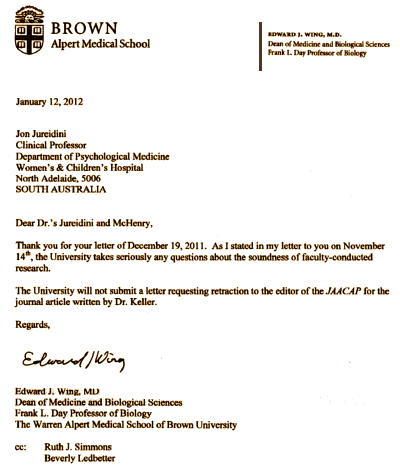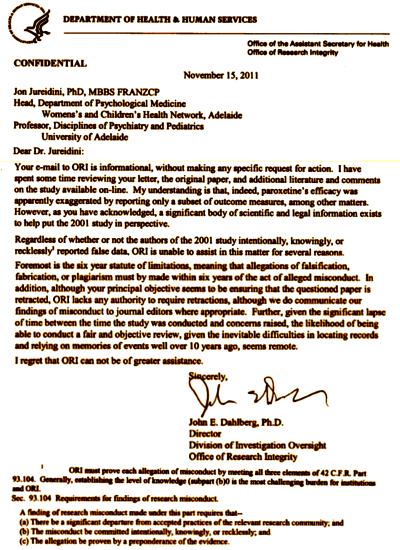You might be tired of hearing about Martin Keller’s Study 329, but I’m not. So I was glad to see Ed Silverman’s post on Pharmalot yesterday with the primary documents for the latest round between Brown University and the people at Healthy Skepticism. How’s this for a non-response?

[click for original]
He also had a letter from the HHS Office of Research Integrity. I was a little surprised at my reaction. I thought it wasn’t half bad in that it at least acknowledged the reality of the complaint, and even though they didn’t take on the task, their procedural explanation at least made sense in the legal context under which they operate [Note to self: The next time a study 329 comes along, report it to HHS early on to see if they’re really willing to take on a case that fits their mandate].

[truncated for simplicity]
[click for the original]
But the reason I’m writing about it was my reaction to something in the small print in the footnote. In discussing their requirements for research misconduct, the Office of Research Integrity lists three criteria:
[a]…There be a significant departure from accepted practices of the relevant research community; and
[b]…The misconduct be committed intentionally, knowingly, or recklessly; and
[c]…The allegation be proven by a preponderance of the evidence.
[b] and
[c] are shoe ins – well demonstrated by a library of publicly available documents and dramatically illustrated in Alison Bass’s book,
Side Effects: A Prosecutor, a Whistleblower, and a Bestselling Antidepressant on Trial. But my thought was that in the final analysis,
[a] is the real problem [
There be a significant departure from accepted practices of the relevant research community]. Unfortunately, the in 2001 when Study 329 was published, it was hardly a singular occurrence for a ghost-written, industry funded, research article with fudged numbers and unsupported conclusions to get published in our psychiatric literature.
Looking at the output of author, Sally Laden, during that period, Paul Thacker [then with POGO] found plenty of other similar examples of her work [
POGO Letter to NIH on Ghostwriting Academics]. This time last year, I was looking at the studies that got Seroquel approved a few years before Keller’s Study 329, and found this kind of note in the Acknowledgements of all the papers [
seroquel III: their best shot…]:
Accepted for publication November 6, 1996. This study was supported by a grant from Zeneca Pharmaceuticals, Macclesfield, England, and Wilmington, Del. We thank Suzanne Bristow-Marcalus for medical writing support…
At the same time, Janssen Pharmaceuticals and their contracted medical writing firm,
Excerptia Medica, were churning out articles about Risperdal so fast that they got behind in finding academics to sign on as guest authors [
bipolar kids: harvard for sale…,
gpp?…]. And this from the Forest Laboratories CEO in his 2004 business plan for Lexapro [
or ghostwritten for…]:
And who could forget Jon Kilner, ubiquitous writer for Dr. John Rush and the STAR*D team [
a study in pollen…]?
These are just a few examples of a widespread practice found by an old guy in the Appalachians with nothing but a good Internet connection and some free time, but I can easily extrapolate that given the right tools and access, a full compendium of ghost-written, industry funded, inaccurate scientific articles from the era would fill volumes. So though I doubt that Martin Keller and his twenty-one other co-guest-authors would mount an argument that "everyone does it!" in any public forum, I expect that fact is well-known to decision makers behind closed doors, and a major force in Brown University and Dr. Wing refusing to deal definitively with Martin Keller’s clear [and dangerous] infraction. The unacceptable had become routine.


Earlier today I read a Health Care Renewal blog post about the Memorial Sloan Kettering president’s suit in which he is named for allegedly absconding with intellectual property from the Abramson Family Cancer Research Institute HOUSED, but apparently not OF at U Penn. In teasing apart who is named and who is not named as a party in the suit, the liabilities that Bayh-Dole from 30 years ago are causing are becoming abundantly clear. The summary is especially alarming:
The cognitive dissonances evoked by the case of the Abramson Institute vs Dr Thompson ought to inspire questions about what our academic medical institutions have become. While they proclaim their devotion to research and teaching to improve health and health care, and advance science, they may increasingly act like commercial research organizations whose main goal is to generate increased revenue from products and services, and in this case, from intellectual property. ~snip~
We are now a good 30+ years into our ill-fated American experiment about the effects of turning medicine commercial and making health care a commodity. So far, it has yielded the highest costs in the world, but declining access, mediocre quality, and demoralized professionals.
I think this is part and parcel of the drivers behind the usurpation of academic psychiatry, as well.
aek–
I expect this holds true across ALL scientific fields. When my husband left academia, the influence of BigAg and BigChem was already being felt. Once satisfied to provide product (experimental) for unbiased evaluation, let the thesis/dissertation say what it does, BigAg (like BigMedicine) wanted more control. Now whatever products (and grants) they provide, come with a host of strings–enough to invalidate much research that still appears under the banner “scientific.”
Melody: Excellent points, all. I wonder if Grassley or any of his colleagues are examining these aspects of the COI issues.
Alison Bass has just blogged about this specious Statute of Limitations dodge by ORI – see http://alison-bass.com/blog/2012/02/when-it-comes-to-scientific-misconduct-should-there-be-a-statute-of-limitations/